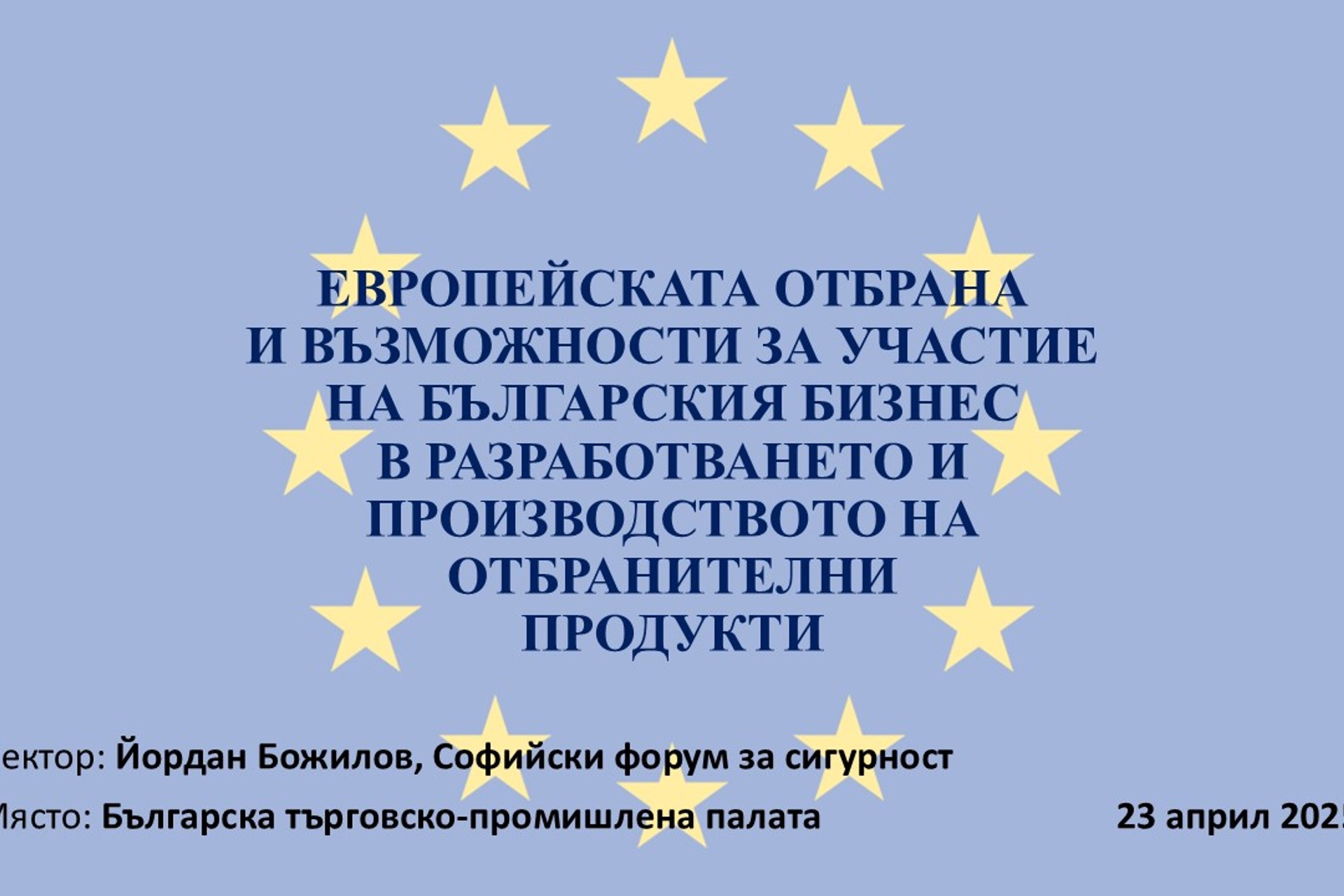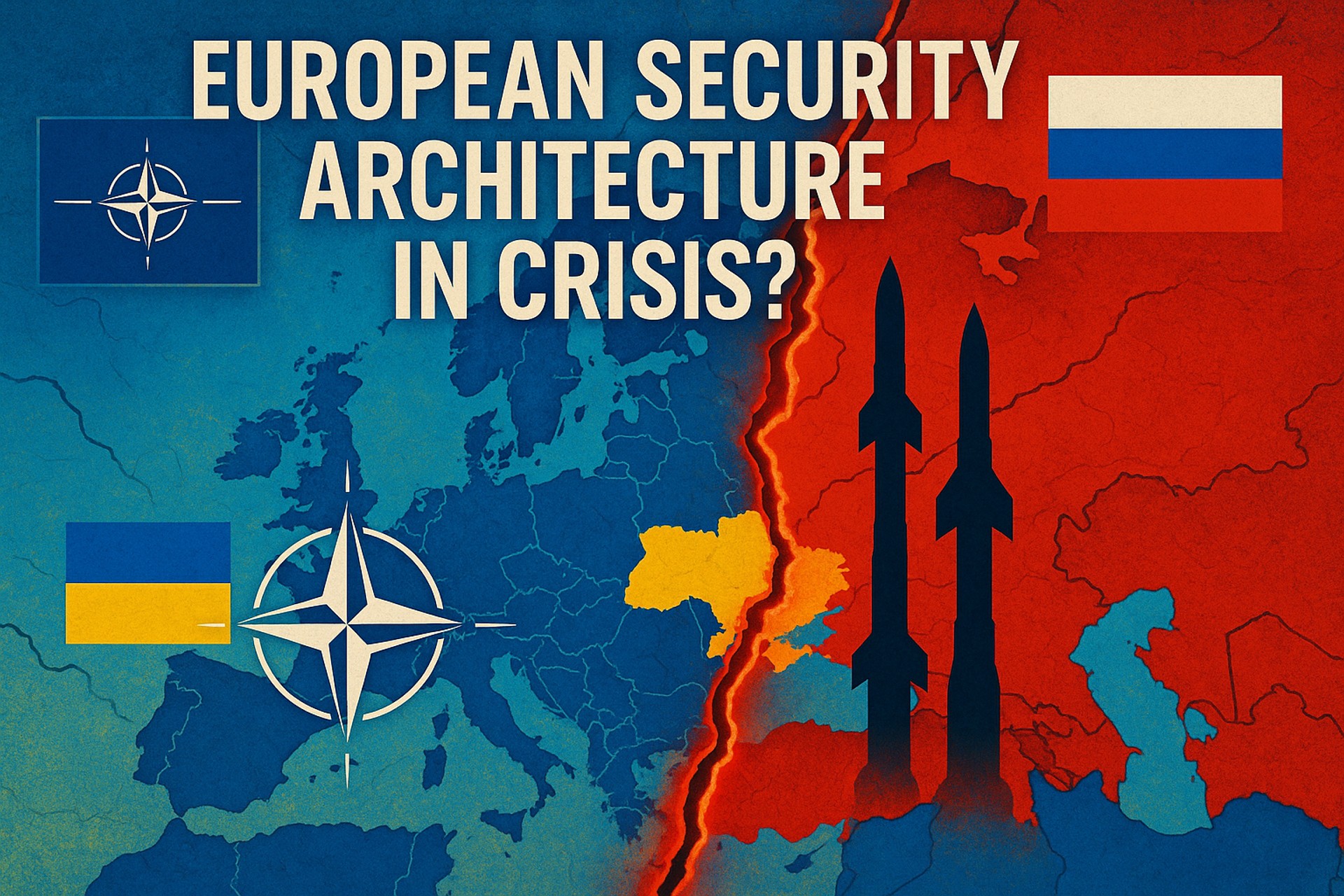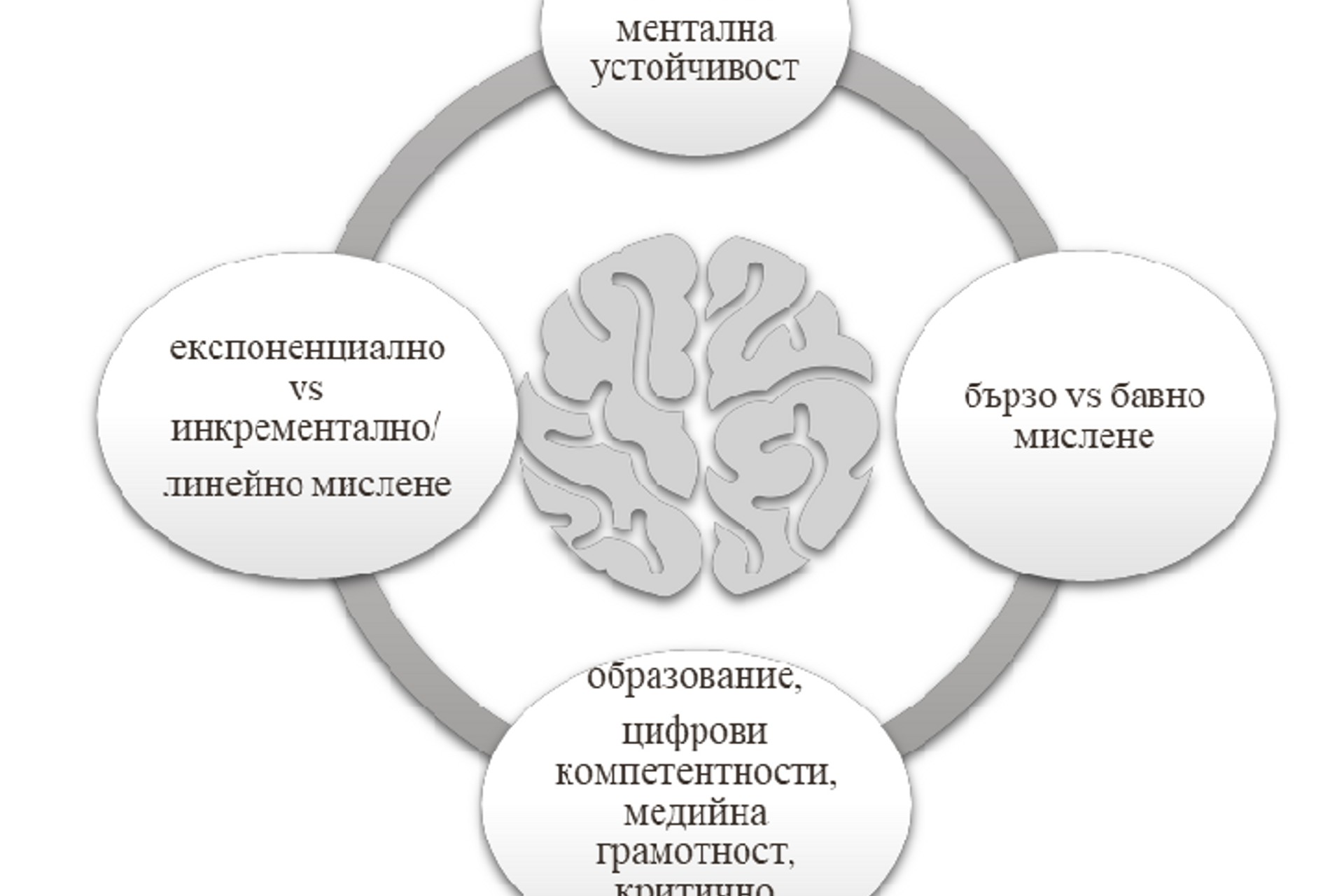European Union
EU

EUROPEAN DEFENSE AND OPPORTUNITIES FOR BULGARIAN BUSINESS PARTICIPATION IN PROJECTS
The lecture was delivered to members of the Bulgarian Chamber of Commerce and Industry and presented the main ideas of European defense and the opportunities for participation in various projects, primarily under the European Defense Fund.
Йордан Божилов
Article
Security and Defense
European Union

"EUROPEAN SECURITY ARCHITECTURE IN CRISIS?"
On April 15, 2025, a roundtable discussion titled “Is the European Security Architecture in Crisis?” was held in the “Egg” Hall at Sofia University’s Rectorate. The event was co-organized by the Master's Program in International Security at the Faculty of Law, led by Associate Professor Dr. Mira Kaneva, and the Master's Program in Crises, Conflicts, and Diplomacy in Global Politics at the Faculty of History, led by Associate Professor Dr. Boris Stoyanov. Special guest speakers included Yordan Bozhilov, Chairman of the Sofia Security Forum and former Deputy Minister of Defense, who outlined the future of European security architecture through the lens of Bulgaria; Dr. Plamen Dimitrov from the Bulgarian Geopolitical Society, who analyzed European security between Putin’s revisionism and Trump’s unpredictability; and Associate Professor Dr. Hristo Hristov, an EU Law lecturer at the Faculty of Law, who discussed the prospects for strengthening the EU's defense readiness. In the second part of the discussion, two student teams from the International Security Master's Program presented the results of their group research. Todor Mihaylov introduced the report “Autonomy in European Security – Can Europe Become Independent from the U.S. in Defense?”, co-authored with Simeon Krushev and Nikolay Slavkov. Their analysis focused on Europe’s dependency in key military capabilities, NATO’s role, options for enhancing EU defense autonomy, and the future of transatlantic relations. Verginia Petrova presented the report “China’s New Economic and Strategic Approach to Europe”, prepared with Iva Veselinova, Kristina Mincheva, and Yoanna Ognyanova. The report examined challenges to the EU's economic resilience, digital security, and strategic autonomy, and proposed a model of selective partnership with China. Their presentations sparked lively debate among students from both master’s programs, doctoral candidates in International Relations Denitsa Kovacheva and Nikola Peykov, and other guests. Discussions focused on security threats in the Black Sea region and the Western Balkans, the global commitments of the U.S. and EU, and hybrid threats such as algorithmic radicalization and anti-democratic propaganda.
Event
Global Challenges
Security and Defense
European Union

EUROPEAN SECURITY ARCHITECTURE IN CRISIS?
The material contains two articles: "European Security Autonomy - Can Europe be Independent of the US in the Field of Defense?" and "China's New Economic and Strategic Approach to the EU", which were presented by the authors at a conference held on April 15, 2025 at Sofia University.
Тодор Михайлов, Симеон Крушев, Николай Славков, Илияна Аризанова, Вергиния Петрова, Йоанна Огнянова, Кристина Минчева, Ива Веселинова
Article
Global Challenges
Security and Defense
European Union
NATO

CALIBRATING THE STRATEGIC COMPASS FOR А NEW ERA IN EUROPEAN DEFENCE
The publication aims on the one hand to show the strategic priority for a new era in European defence in the starting mandate of the European institutions (2024-2029), and on the other hand to draw certain conclusions about the Common Security and Defence Policy (CSDP) and the need to calibrate its Strategic Compass, taking into account the "inclination and deviation" in the course towards building the European Defence Union. Emphasis is placed on the need for an exponential way of strategic thinking, taking into account AI, climate, security and defence issues as crosscutting elements for all EU policies.
Monika Panayotova
Article
Security and Defense
European Union

SECURITY RISKS AND CHALLENGES IN THE BLACK SEA REGION
Talking points for the EU Institute for Strategic Studies
Yordan Bozhilov
Brief
Global Challenges
Balkans and Black Sea
Security and Defense
European Union
NATO

BUILDING RESILIENCE IN THE EUROPEAN UNION IN TIMES OF POLYCRISIS AND CHALLENGES IN THE COGNITIVE DOMAIN
This aim of this publication is to draw attention to the need to build resilience in the societies and Member States of the European Union in times of “polycrisis” and challenges in the cognitive domain. Following an analysis of global risks and hybrid threats, as well as the emergence of artificial intelligence in today‘s communication and security environment, certain recommendations and conclusions are drawn to enable the EU to exploit its potential to be a “multidimensional power”, overcoming non-kinetic challenges to vulnerabilities in democratic societies, citizens‘ minds and emotions. In this research, a range of political science analysis methods were employed. In addition, the “mind maps” technique of the British psychologist Tony Buzan was implemented by enabling the synthesis of ideas through visual representations. On the eve of the European elections in 2024, the publication draws key conclusions and recommendations for overcoming the challenges of desinformation, perception management and psychological manipulation, which undermine trust in democratic institutions and prevent decisionmakers from countering them. These include: building resilience through education, media literacy, critical thinking, digital competencies, mental toughness; the ability to think not only fast but also slow; the application of exponential design to strategic thinking; multilateralism and close cooperation with NATO. https://www.ceeol.com/search/article-detail?id=1215198
Assist. Prof. Monika Panayotova, PhD, Vice President of the Sofia Security Forum
Book
Global Challenges
Cyber Security and New Technologies
European Union
NATO
